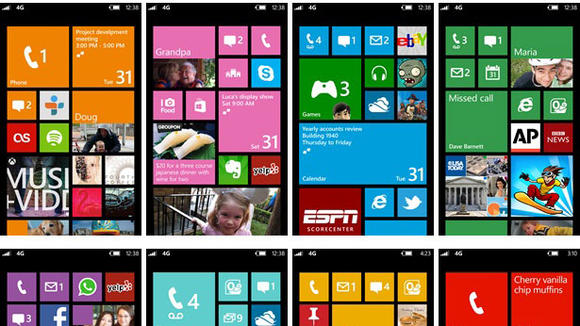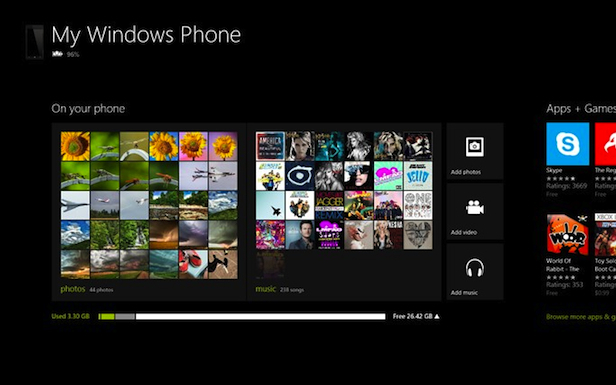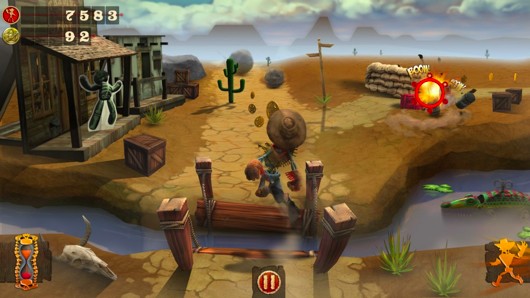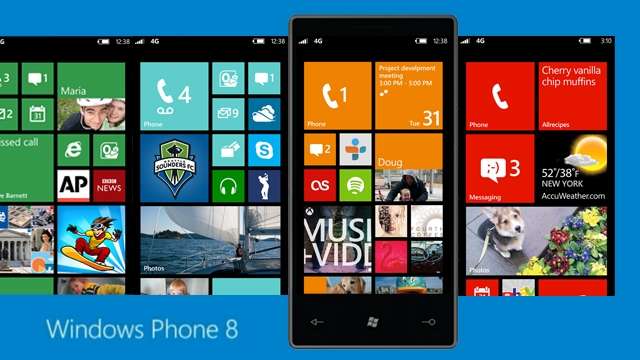Windows Phone 8 release date and latest details
Windows Phone 8 review.
Microsoft has officially announced Windows Phone 8 (which you may know better as Apollo) and confirming many of the rumors about the new operating system at the Windows Phone Summit.
The new operating system is tasked with catching up to the dominate iOS and Android platforms, and become the stand-out third choice mobile OS, something RIM is also hoping to achieve once it launches BlackBerry 10 early next year.
Windows Phone 8 release date
Microsoft held a special Windows Phone 8 event in San Francisco on October 29 to officially launch the latest version of its mobile operating platform.
We've already seen three manufacturers announce their first Windows Phone 8 device, the Nokia Lumia 920 and Lumia 820, HTC Windows Phone 8X and Windows Phone 8S and the Samsung Galaxy Ativ S.
And it's the HTC 8X which is first out of the Windows Phone 8 blocks, going on sale on November 2, while the rest of the pack at left with just a November release date for now.
Check out our Windows Phone 8 release date: when can I get my new phone? article for all the information on the handsets in the UK.
Huawei has also been granted permission by Microsoft to build a Windows Phone 8 handset for launch, but we're yet to hear any official on this from the Chinese firm, with rumours pointing towards a slightly more budget handset, possibly called the Ascend W1.
Windows Phone 8 handsets
Samsung, Huawei, HTC and Nokia are the only confirmed Windows Phone 8 manufacturers at this time - although ZTE told TechRadar it will be launching WP8-powered handsets in 2013.
During IFA 2012 in Berlin Samsung unveiled its first Windows Phone 8 handset, the Ativ S, which packs a large 4.8-inch HD Super AMOLED display and a 1.5GHz dual-core processor, with the choice of 16GB and 32GB of internal storage.
Find out what we think in our hands on Samsung Ativ S review
Huawei will be bringing out a Windows Phone 8 handset by the end of the year too, with Shao Yang, chief marketing officer for Huawei, saying: "We are poised to end the year with a big bang – with the introduction of our first smartphone running on the Windows Phone platform."
Nokia has also unveiled its first two handsets to run Windows Phone 8 at a special event in New York.
The flagship Nokia Lumia 920 heads up the Finnish firm's range, sporting a 4.5-inch HD display, 1.5GHz dual-core processor, 8.7MP rear 'Pureview' camera, 32GB of internal memory and 1GB of RAM, helping it to run Microsoft's latest mobile platform.
Find out what we think in our hands on Nokia Lumia 920 review
Nokia's second device is the Lumia 820 – a mid-range handset which features a 4.3-inch screen, 1.5GHz dual-core processor, NFC and 1,650mAh battery.
Find out what we think in our hands on Nokia Lumia 820 review
HTC has officially joined the Windows Phone 8 game too, with the launch of the HTC Windows Phone 8X and HTC Windows Phone 8S.
Given the phones are officially called 'Windows Phone 8X/S by HTC' it's a curious move from Microsoft to make the Taiwanese manufacturer the flagship brand for the new version of the platform.
Both phones exhibit solid design, feel great in the hand, and while they're not as thing as the competition offer tapered chassis to add a better position during use.
The 8X and 8S both offer up Beats Audio for enhanced sound, but the 8X is the superior experience thanks to a larger 4.3-inch screen, compared to the 4-inch of the latter.
Microsoft might be planning on launching its own smartphone, with rumours surrounding a Surface handset doing the rounds, further boosted by Nokia's CEO dropping a possible hint.
Windows Phone 8 prices
The Nokia Lumia 920 is the most expensive of the first wave of Windows Phone 8 devices, but that's no surprise as it packs the most tech.
You will however, need to fork out £36 per month plus an upfront charge of £49 on EE in the UK to get your mitts on the Lumia 920.
The Nokia Lumia 820 is slightly more affordable, available for free on contracts starting at £31 per month, while the Samsung Ativ S is only being carried by O2 for free at £36 per month.
If you want one of the HTC Windows Phone 8 handsets prices are similar to the Samsung, with the HTC 8X available from £31 per month, and the HTC 8S starting at just £20.50 per month.
For more information head over to our Windows Phone 8 release date: when can I get my new phone? article.
At the other end of the scale, the unconfirmed Huawei Ascend W1 is expected to be the cheapest, with sources claiming it will come in at around $300-$350 (£185-215/AU$290-340).
Windows Phone 8 apps
The problem for Windows Phone is less the existing users – who tend to be enthusiastic as well as demanding – and more selling the phones.The partnership with Nokia is certainly helping, as will the announcement that the Windows Phone Marketplace is now up to 100,000 apps with more coming - from the PayPal support for Wallet to iPhone must-haves like Words with Friends and Audible, plus Zynga's newly acquired Draw Something.All Windows Phone 7 apps will run on Windows Phone 8 handsets; but in future developers will have to choose whether to make an app that only uses Windows Phone 7 features and works on both, or one that uses Windows Phone 8.
This means supporting features like Wallet, VOIP, native code or being able to run navigation in the background (which should mean we finally see some full-featured turn-by-turn navigation apps that go beyond what Nokia Drive offers).TomTom clearly sees the power of Nokia Drive too, as it reckons it will be looking at a Windows Phone 8 app in the future, despite saying it has 'a bit of a love hate relationship with Windows Phone'.EA has come out in support of Windows Phone 8 platform too, with the powerful Windows 8 synergy seemingly enough to encourage the brand to state: "Anything that allows more platforms to be adopted quickly that have a gaming element is good for Electronic Arts."
However, BBC iPlayer isn't likely to appear on the platform due to the development tools used, meaning it will still lag behind iOS and Android in the VOD stakes.There are other advantages, but with the interfaces to components like graphics, audio and sensors being far more similar to those in Windows 8, it's a lot easier to write Windows 8 and Windows Phone 8 apps that share features.Or, of course, they can make two versions, one for 7 and one for 8; how often that happens is going to depend both on how easy Microsoft makes it to share code between versions of apps in its developer tools and on sales of Windows Phone 8 handsets.
Windows Phone 8 interface
There is one feature of Windows Phone you will be able to get on current handsets (with an update that has the strikingly appropriate name of Windows Phone 7.8) and that's the new Start screen. This now uses the whole width of the screen, without the arrow to tell you to swipe sideways for more apps.
With the extra space you can fit in a lot more tiles, which can now be three different sizes. There's a new small size that you can pick for any app, so if you don't need the Office hub or the dialler to have a full size button because there's not that much useful information on them, you can shrink them down.
And as well as the current standard tile size, any app will be able to have an extra-large tile to fit more details onto the live tile. Along with some new colour schemes, that makes the Start screen look much more personal.
But the overall look of the platform hasn't changed dramatically – you're still offered a list of apps adjacent to the Start screen, and the panorama method of seeing more information by moving horizontally remains – after all, why change one of the best things about the old OS?
Microsoft has incorporated a new kind of live wallpaper, which brings live tiles to your lock screen, which can show the likes of sports updates, news stories and photo galleries from your social media accounts.
Another new feature is Rooms, which acts a lot like groups where you can pretty easily create hubs for individual people.
For instance, you can create Rooms for Family, Friends, Sports or Politics and populate the groups with the people who are interested in interacting about those specific topics.
Windows Phone 8 - Kid's corner
Ever buy yourself a minute of peace by handing your smartphone off to your child, but end up worrying what apps they may be purchasing?
Kid's Corner on Windows Phone 8 is a feature designed to eliminate such worries, by letting you choose which apps your little ones can access.
They'll be able to customise their own homescreen, and have a lock screen with their name and picture, and it's all controlled from the settings menu. Peace at last.
Windows Phone 8 – under the hood
Windows Phone 8 is a major new version, running the kernel from Windows rather than from Windows CE.
It isn't the same as Windows 8, or even Windows RT – even though that also runs on ARM processors – and it doesn't have the same look to the Start screen and Metro-style WinRT apps won't run on Windows Phone 8.
Hands on: Windows 8 review
But under the hood it's a lot more similar to develop for and Windows Phone gets several key components from 'big' Windows as well as some significant new features and new hardware, which is good news for what developers can make apps do with the increased access they get to the phone system.
Don't expect the same do-anything, break-anything ethos of Android though; battery life and user experience are still priorities for Windows Phone and even native applications run in a sandbox.
Windows Phone 8 future updates
There's good news regarding future software updates on Windows Phone 8, as you won't have to wait until your mobile network gets around to testing and pushing out updates.
There's going to be a way for users to get updates directly from Microsoft (perhaps labelled as beta releases) as long as they assume responsibility for anything that goes wrong.
It's good to see Microsoft is finally doing something to address the problem of upgrades that would work on your handset but you're frustratingly unable to get due to networks getting in the way – listen up, Google.
Windows Phone 8 browser and security
Key features that Windows Phone 8 gets from Windows include Internet Explorer 10, complete with the phishing filter and SmartScreen application reputation service to make it harder for malicious websites to trick you into giving away personal information like credit card details or downloading malware.
Malware hasn't been a problem for Windows Phone so far, but any platform that becomes successful is going to get attacked.
Windows Phone gets other Windows security features like disk encryption and secure boot, so businesses will be happier to use it (especially as they can now manage devices and sideload their own business applications).
Windows Phone 8 media and gaming
Audio, graphics and media playback all work more like their Windows equivalents, which should make for more powerful games and entertainment apps.
However, this means that current games will need to be re-tooled to take advantage of the new platform – the likes of Rovio can leave their games as Windows Phone 7 versions, but they'll likely want to re-release a more powerful version of the game too.
But given the increased GPU support and power on offer, we'll at least start seeing some more 3D-rich gaming environments that start taxing the Windows Phone 8 handsets compared to their previous counterparts.
Video calling
There's one place where Windows Phone is jumping ahead of Windows; VOIP calls will look just like regular phone calls with all the same features and notifications. Obviously that's good for Skype but other VOIP apps like Tango will get the same support.
We're still waiting to see how deep Skype integration gets into the Windows Phone 8 OS, as given it's already available as an app on the Windows Phone Marketplace it should be shoved pretty deeply into the platform.
Is the Xbox next for Skype?
Will it lead to a surge in video calling? Probably not, but as there are strong rumours the Xbox platform will be getting a taste of video calling too it seems only fair that Windows Phone 8 devices, complete with their improved front-facing cameras, should be given priority.
Windows Phone 8 CPU
To make all this work well Windows Phone 8 will run on new hardware; still ARM processors, still the Snapdragon platform from Qualcomm but now with multicore processors, with a new generation of GPUs, and with NFC support.
Battery life is still priority for the platform, so we doubt Microsoft is going to allow any CPUs that get too amorous with the power pack – but more power is a big selling point in today's smartphone market, so this makes enormous sense.
Microsoft Wallet
The new Microsoft Wallet app will allow you to make payments by tapping your phone on a credit card reader the way Google Wallet does, and store credit card and membership details securely and tap your phone to send them the way iOS 6 will.
And you're not tied to using a Microsoft payment service; applications will be able to tap into the Wallet system to set up new payment services – which will include Paypal.
Paypal: NFC could be too late
The app is a hub for digital coupons and debit or credit cards - plus you can add in loyalty cards and third party apps that will notify you when they become relevant.
NFC support
NFC is there for Microsoft's Wallet payment system, but has other options as well. The OS supports secure SIM, which means users' can swap from handset to handset and take their payment method with them physically.
There are other applications that Nokia is keen to utilise as well, such as being able to pair with its Bluetooth accessories with a simple tap of the phone – it's a trick we've seen on the old Symbian phones and one we expect to feature heavily here too.
Speech recognition
Microsoft has teamed up with Audible to bring speech recognition to Windows Phone 8, allowing users to shout a variety of commands at their handsets.
During the keynote presentation, we saw a demo of the speech platform – which allowed a user to play movies, browse audiobooks and perform searches.
It's also available for Mango devices, so pop over to the Marketplace today and search Audible if you fancy a go.
Windows Phone 8 upgrades
That's the reason that you won't be able to upgrade any existing Windows Phone handsets to 8, because they don't have the hardware to support the new features or deliver the multitasking performance that the Windows kernel and the improved VOIP support needs.
Only two of the rumoured new resolutions are being announced, both widescreen formats: 1280 by 768 and 1280 by 720 as well as the current 800 by 480, which should give phone makers more flexibility when it comes to choosing parts they can use in multiple devices.
And Windows Phone finally sorts out its SD card support; you'll be able to store media files on a micro SD card or install applications onto it.
Take a moment to check out our Windows Phone 8 round up video below.







Comments
Post a Comment